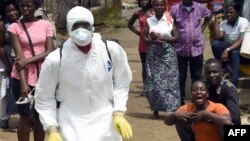African Union Chairwoman Nkosana Dlamini-Zuma is calling for more outside manpower to help "break the cycle" of the Ebola virus that is ravaging three West African countries. She spoke in Paris during a forum on ways to make Africa's economic growth more sustainable and inclusive.
In remarks at the Organization for Economic Cooperation and Development [OECD], Dlamini-Zuma welcomed the help of several countries in fighting West Africa's Ebola outbreak, but she said it was not enough.
"We are encouraged that we have seen the world pledging, and we have seen on the ground the Americans and others building infrastructure," she said. "But what we have seen is still a gap on the human resource side in these countries."
Dlamini-Zuma said the countries most affected -- Guinea, Liberia and Sierra Leone -- do not have enough health personnel and some of the health workers have been casualties of the deadly outbreak. African nations and others, like Cuba, are sending in health workers, but more are needed.
This year's Ebola outbreak has killed roughly 3,500 people in West Africa and is expected to batter the economies of the three countries at the epicenter.
This has cast a shadow on the OECD conference in Paris. Ministers and development experts gathered here to discuss ways to harness Africa's strong growth, estimated at nearly five percent this year, so it is sustainable and more people can benefit from it.
OECD Secretary-General Angel Gurria said the Ebola crisis needs an immediate and large-scale response.
"But [it] also underscores how important investment in health systems is, if we are to avoid seeing history repeat itself. Like climate change, this is a global challenge that needs a global response," said Gurria.
The OECD is calling for more investments in African manufacturing and transportation infrastructure to be able to sell higher-value, finished products and to boost their trade inside Africa and overseas. Right now, said Gurria, Africa accounts for only a tiny percent of worldwide trade in these so-called "value-added" commodities.
"We speak of factory Asia. But I look forward to the day when we will also speak of "factory Africa," he said.
Gurria called for greater institutional reforms and investment in new technology, particularly in renewable energy. He said this year the number of renewable green-energy projects commissioned in sub-Saharan Africa may surpass the total of the past 14 years.




